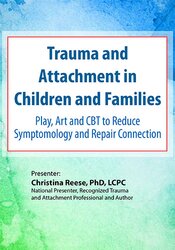

What came first, the loss of attachment or the diagnosis … Anxiety, ADHD, ODD?
For the child who is oppositional, did they respond with opposition after feeling disconnected from their primary attachment or have their oppositional behaviors put stressors on their primary relationships?
Imagine a client/family in your office and you’re hearing about the oppositional and defiant child’s behavior from frustrated parents – which came first, the behavior and then the rupture in attachment. Or did the attachment come first and is showing as a behavioral disorder?
Watch me to become more successful in helping identify and heal ruptured attachments in family and children. Learn the ways that attachment trauma and relationship dysfunction impacts a child’s ability to feel safe with adults, follow directions and be respectful.
Reframe the behaviors to identify the distress, learn how attachment trauma is related to every diagnosis, and how repairing the primary attachment relationship can reduce symptomology.
Discover attachment-focused interventions to:
Bring life-altering change to the children that you are working with, repairing foundational relationships and giving them the skills they need for life-long relationships, health and stability.
This online program is worth 6.25 hours CPD.
| File type | File name | Number of pages | |
|---|---|---|---|
| Manual - Trauma and Attachment in Children and Families (1.57 MB) | 35 Pages | Available after Purchase |

Christina Reese, LCPC, PhD, has been working with children impacted by trauma and their families for the last 20 years. She is a licensed clinical counselor in Maine, Maryland, and Pennsylvania and is a licensed clinical supervisor. Dr. Reese is an internationally recognized trainer for mental health professionals in creating trauma-informed schools, working with mental health in the classroom and attachment and trauma in children. She is a TBRI practitioner and owns Felicity Counseling Services. Dr. Reese authored the books Attachment, Puzzle Pieces, The Attachment Connection, Trauma and Attachment, The Socially Confident Teen, and Leveling Up.
Speaker Disclosures:
| 5 |
|
| 4 |
|
| 3 |
|
| 2 |
|
| 1 |
|
Satisfaction Guarantee
Your satisfaction is our goal and our guarantee. Concerns should be addressed to info@pesi.co.uk or call 01235847393.
Please wait ...